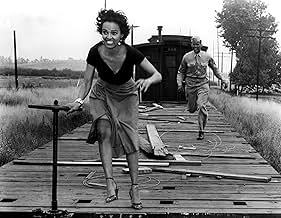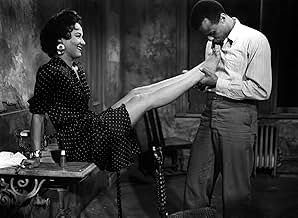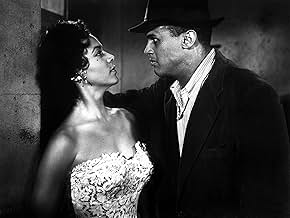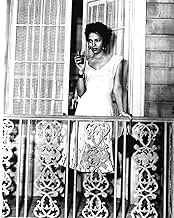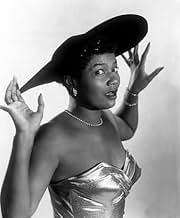AVALIAÇÃO DA IMDb
6,7/10
6,2 mil
SUA AVALIAÇÃO
Uma versão contemporânea da ópera Carmen de Georges Bizet, ambientada no contexto da Segunda Guerra Mundial, com novas letras e um elenco afro-americano.Uma versão contemporânea da ópera Carmen de Georges Bizet, ambientada no contexto da Segunda Guerra Mundial, com novas letras e um elenco afro-americano.Uma versão contemporânea da ópera Carmen de Georges Bizet, ambientada no contexto da Segunda Guerra Mundial, com novas letras e um elenco afro-americano.
- Direção
- Roteiristas
- Artistas
- Indicado a 2 Oscars
- 6 vitórias e 8 indicações no total
Brock Peters
- Sergeant Brown
- (as Broc Peters)
LeVern Hutcherson
- Joe
- (narração)
- (as Le Vern Hutcherson)
Marilyn Horne
- Carmen Jones
- (narração)
- (as Marilynn Horne)
Marvin Hayes
- Husky Miller
- (narração)
Alvin Ailey
- Dance Soloist
- (não creditado)
DeForest Covan
- Trainer
- (não creditado)
Joseph E. Crawford
- Dink Franklin
- (canto)
- (não creditado)
Carmen De Lavallade
- Dance Soloist
- (não creditado)
Bernie Hamilton
- Reporter
- (não creditado)
Margaret Lancaster
- Singing Voice
- (não creditado)
- Direção
- Roteiristas
- Elenco e equipe completos
- Produção, bilheteria e muito mais no IMDbPro
Avaliações em destaque
It's incredible that it took an Austrian director, Otto Preminger, the courage to bring this wonderful screen adaptation of the Bizet's immortal opera Carmen to the American public. As a musical, "Carmen Jones" had been seen, successfully, on Broadway, because of the many talented black performers that weren't allowed to be seen in Hollywood movies. Preminger had a knack for tackling issues that other, better known directors, stayed away from.
"Carmen Jones", as seen today, shows us a film that is somehow dated, but when it made its debut, it surprised a lot of people because it was a revolutionary work, something the American movie goers weren't used to seeing. The strength of the film lies in the performances Mr. Preminger got from his multi-talented cast.
The adaptation of the opera sets the film in the South. We are taken to a military base during the war. The local people work in the factory, attached to the base, making parachutes and other war related equipment. Carmen Jones, is the sultry young woman who sticks out from the rest of her co-workers, not only by her beauty, which was obvious, but by the way she can reduce men to servitude, which is what happens to Joe, the man who is being promoted until fate intervenes and Carmen renders him useless.
The gorgeous Dorothy Dandridge made a magnificent Carmen Jones. In fact, this was Ms. Dandridge's best screen work because she smolders the screen every time she is seen in the film. Harry Belafonte is Joe, the man whose passion for the lovely Carmen will consume him and will not let him see straight. Pearl Bailey is a delight in her take of Frankie. Olga James is seen as the sweet Cindy Lou, the girl in love with Joe. Joe Adams, Brock Peters and a young Diahann Carroll are also seen in minor roles.
Some comments to the IMDb forum express their displeasure at the way the voices are heard. This seems to have been the only thing that Preminger should have worked with his collaborators Oscar Hammerstein II and Harry Kleiner into having the opera melodies sung naturally, the way one would expect Ms. Dandridge, who could sing, and of course, Harry Belafonte, a wonderful singer, to deliver them in a way that would have pleased those audiences not accustomed to hearing classical opera.
Regardless of what we think today, this was one of the breakthroughs that proved to America they could enjoy black performers on their merits and talent. Otto Preminger must be praised for being a pioneer in this field and for daring to be a man ahead of his time.
"Carmen Jones", as seen today, shows us a film that is somehow dated, but when it made its debut, it surprised a lot of people because it was a revolutionary work, something the American movie goers weren't used to seeing. The strength of the film lies in the performances Mr. Preminger got from his multi-talented cast.
The adaptation of the opera sets the film in the South. We are taken to a military base during the war. The local people work in the factory, attached to the base, making parachutes and other war related equipment. Carmen Jones, is the sultry young woman who sticks out from the rest of her co-workers, not only by her beauty, which was obvious, but by the way she can reduce men to servitude, which is what happens to Joe, the man who is being promoted until fate intervenes and Carmen renders him useless.
The gorgeous Dorothy Dandridge made a magnificent Carmen Jones. In fact, this was Ms. Dandridge's best screen work because she smolders the screen every time she is seen in the film. Harry Belafonte is Joe, the man whose passion for the lovely Carmen will consume him and will not let him see straight. Pearl Bailey is a delight in her take of Frankie. Olga James is seen as the sweet Cindy Lou, the girl in love with Joe. Joe Adams, Brock Peters and a young Diahann Carroll are also seen in minor roles.
Some comments to the IMDb forum express their displeasure at the way the voices are heard. This seems to have been the only thing that Preminger should have worked with his collaborators Oscar Hammerstein II and Harry Kleiner into having the opera melodies sung naturally, the way one would expect Ms. Dandridge, who could sing, and of course, Harry Belafonte, a wonderful singer, to deliver them in a way that would have pleased those audiences not accustomed to hearing classical opera.
Regardless of what we think today, this was one of the breakthroughs that proved to America they could enjoy black performers on their merits and talent. Otto Preminger must be praised for being a pioneer in this field and for daring to be a man ahead of his time.
Even after the success of Oklahoma, the partnership of Rodgers&Hammerstein was not cast in stone yet. After Oklahoma debuted, Oscar Hammerstein, II went to work on his next Broadway show with a dead collaborator. He wrote new lyrics for the music of Georges Bizet's opera Carmen and wrote a new book for an all black cast to perform it, in the tradition of Porgy and Bess.
That show was Carmen Jones and it ran for 502 performances on Broadway from 1943 to 1945. Hammerstein discovered what the team of Robert Wright and Chet Forrest had previously found out in adapting Edvard Grieg's melodies into their hit, Strange Music. That there's nothing like writing with a collaborator who can't complain and who's melodies are already a hit.
In fact while the show was originally on Broadway, Rise Stevens had sung in Going My Way the song that eventually became Dat's Love. And Nelson Eddy and sung The Toreador Song in his film Balalaika. Hammerstein brilliantly capitalized on some free publicity for his own show.
Harry Belafonte and Dorothy Dandridge give great acting performances though it's kind of strange to hear other voices coming from the mouths of two good singers. Their voices weren't operatic though, yet the singers dubbing them matched well with the personalities of both the leads. And Dandridge had Marilyn Horne, you can't do much better than that.
The whole thing originates from the French novelist's Prosper Merimee's story of the ill effects of passionate love. Harry Belefonte's on his way to being a Tuskegee airman and he runs afoul of Carmen Jones. Belefonte's got himself a gal, but Dandridge puts on her Delilah routine and Belefonte's dead meat.
In addition to Samson and Delilah the Belefonte character is remarkably similar to George Hurstwood in Theodore Dreiser's Sister Carrie. Another man who threw it all away for passion. I wouldn't be surprised if Dreiser refined Merimee's theme.
But Dandridge's performance is the best. As the hedonistic Carmen Jones, she's a wonder on screen. Seeing her realize that part on the screen, we can well understand why Belefonte threw it all away for love. Dandridge became the first black woman nominated in the Best Actress category, but she lost the Oscar sweepstakes to Grace Kelly for The Country Girl.
For those who like the opera Carmen, I think they'll be well pleased with Oscar Hammerstein, II did with Bizet's music and Merimee's story.
That show was Carmen Jones and it ran for 502 performances on Broadway from 1943 to 1945. Hammerstein discovered what the team of Robert Wright and Chet Forrest had previously found out in adapting Edvard Grieg's melodies into their hit, Strange Music. That there's nothing like writing with a collaborator who can't complain and who's melodies are already a hit.
In fact while the show was originally on Broadway, Rise Stevens had sung in Going My Way the song that eventually became Dat's Love. And Nelson Eddy and sung The Toreador Song in his film Balalaika. Hammerstein brilliantly capitalized on some free publicity for his own show.
Harry Belafonte and Dorothy Dandridge give great acting performances though it's kind of strange to hear other voices coming from the mouths of two good singers. Their voices weren't operatic though, yet the singers dubbing them matched well with the personalities of both the leads. And Dandridge had Marilyn Horne, you can't do much better than that.
The whole thing originates from the French novelist's Prosper Merimee's story of the ill effects of passionate love. Harry Belefonte's on his way to being a Tuskegee airman and he runs afoul of Carmen Jones. Belefonte's got himself a gal, but Dandridge puts on her Delilah routine and Belefonte's dead meat.
In addition to Samson and Delilah the Belefonte character is remarkably similar to George Hurstwood in Theodore Dreiser's Sister Carrie. Another man who threw it all away for passion. I wouldn't be surprised if Dreiser refined Merimee's theme.
But Dandridge's performance is the best. As the hedonistic Carmen Jones, she's a wonder on screen. Seeing her realize that part on the screen, we can well understand why Belefonte threw it all away for love. Dandridge became the first black woman nominated in the Best Actress category, but she lost the Oscar sweepstakes to Grace Kelly for The Country Girl.
For those who like the opera Carmen, I think they'll be well pleased with Oscar Hammerstein, II did with Bizet's music and Merimee's story.
Some greatness here. Dandridge's performance is riveting, and Pearl Bailey is a wonderful addition. Bizet's music is as appealing as always. The singers are excellent. The dancers at Billy Pastor's are another high point.
Too many slips for me to rate it a 10. It's lip-synced -- like every other movie musical, and (despite what one other reviewer said), one of the best lip-sync jobs I've seen. Only My Fair Lady does better (of those I've seen). Dandridge, Belafonte, and Bailey are particularly good; Olga James much less so. But I always find lip-syncing painfully obvious and distracting and will probably never have a chance to top-rate a movie musical as a result. It's also quite distracting when Joe breaks into song, because LeVern Hutcherson's voice is so different from Harry Belafonte's. It's a real shame that experienced singers like Dandridge and Belafonte weren't allowed to sing. Marilyn Horne, wow -- but I like the voice to match the face.
The acting is uneven. Some is excellent, led by Dandridge, and others do well too. But some of the acting is stiff.
Then there's the re-setting. Oh, moving the place is fine. It's funny that a couple of reviewers have referred to "how the Spaniards do it" and "Spanish opera". Hey, Carmen is set in Seville and Bizet attempted to use some Spanish musical idioms, but Carmen is a French opera through and through. Bizet was French, Prosper Merimee was French, the libretto is in French. But Carmen Jones only uses the top arias from Carmen, and ends up adding a lot of dialog to fill in the time. The story is true to the original, but Bizet told more in music and Hammerstein tells more in words. Oscar should have trusted Georges more.
I notice that Alvin Ailey is uncredited as a dancer. I found a couple of photos of him on the web -- it's hard, because his dance company has been so much more famous than the man, but I found a couple. I *think* I figured out which one he is -- some slo-mo work there -- but most of the dancers' faces don't come into focus for long enough to know for sure. It would be mostly a curiosity to know, since the movie doesn't show enough of the dance to see any personal style.
Too many slips for me to rate it a 10. It's lip-synced -- like every other movie musical, and (despite what one other reviewer said), one of the best lip-sync jobs I've seen. Only My Fair Lady does better (of those I've seen). Dandridge, Belafonte, and Bailey are particularly good; Olga James much less so. But I always find lip-syncing painfully obvious and distracting and will probably never have a chance to top-rate a movie musical as a result. It's also quite distracting when Joe breaks into song, because LeVern Hutcherson's voice is so different from Harry Belafonte's. It's a real shame that experienced singers like Dandridge and Belafonte weren't allowed to sing. Marilyn Horne, wow -- but I like the voice to match the face.
The acting is uneven. Some is excellent, led by Dandridge, and others do well too. But some of the acting is stiff.
Then there's the re-setting. Oh, moving the place is fine. It's funny that a couple of reviewers have referred to "how the Spaniards do it" and "Spanish opera". Hey, Carmen is set in Seville and Bizet attempted to use some Spanish musical idioms, but Carmen is a French opera through and through. Bizet was French, Prosper Merimee was French, the libretto is in French. But Carmen Jones only uses the top arias from Carmen, and ends up adding a lot of dialog to fill in the time. The story is true to the original, but Bizet told more in music and Hammerstein tells more in words. Oscar should have trusted Georges more.
I notice that Alvin Ailey is uncredited as a dancer. I found a couple of photos of him on the web -- it's hard, because his dance company has been so much more famous than the man, but I found a couple. I *think* I figured out which one he is -- some slo-mo work there -- but most of the dancers' faces don't come into focus for long enough to know for sure. It would be mostly a curiosity to know, since the movie doesn't show enough of the dance to see any personal style.
Dorothy Dandrige's roles went beyond that of sex symbol to being a parody of female sexuality
Carmen Jones is a powerful display of her appeal
Based on Bizet's operatic masterpiece, Otto Preminger's film is the story of a GI about to go to flying school (Harry Belafonte), a noble young man who loves the cigarette-maker Carmen very dearly
Filled with passionate songs and a first-rate supporting cast, the movie is filled with exciting musical numbers that are necessary to the film But as impeccable and skillful the supporting cast is, this is Dandrige's magnetic star of enduring international appeal Her Carmen is a flame of fire, isolating in a few moments the essence of her attraction Her enigma sustained throughout a career notable for its startling changes of tempo and direction Her shapely figure, blazing eyes, with the air of the unexpected add up a touch of melancholy to even the most routine sequences Her performance was a parable of love and its power to destroy if misused
Based on Bizet's operatic masterpiece, Otto Preminger's film is the story of a GI about to go to flying school (Harry Belafonte), a noble young man who loves the cigarette-maker Carmen very dearly
Filled with passionate songs and a first-rate supporting cast, the movie is filled with exciting musical numbers that are necessary to the film But as impeccable and skillful the supporting cast is, this is Dandrige's magnetic star of enduring international appeal Her Carmen is a flame of fire, isolating in a few moments the essence of her attraction Her enigma sustained throughout a career notable for its startling changes of tempo and direction Her shapely figure, blazing eyes, with the air of the unexpected add up a touch of melancholy to even the most routine sequences Her performance was a parable of love and its power to destroy if misused
Preminger filmed this very quickly -- 17 days, I'm told -- in real or real-looking locations in the South, in widescreen. He cast top African-American talent and dubbed most of the cast, even those who could sing, to heighten the operatic effect.
Dandridge and Belafonte must be one of the most spectacularly beautiful couples in all the movies, and they play out the juicy old melodramatic plot for all it's worth (though his lack of acting training shows). The Hammerstein lyrics are mostly brilliant, and the original Merimee story is cleverly transplanted to a different time and place. The film's main trouble is its inconsistency of style -- it lurches from melodrama to comedy to musical comedy to opera, sometimes within a couple of scenes. The acting styles go from natural to hyper depending on what kind of scene is being played, so nothing really hangs together. In the better musicals, the moment where dialogue turns into song is subtly handled, so you're not really aware of the transition from realism to fantasy, but here there are huge bumps from one style to the next.
Still, it's good over-the-top entertainment, and, as noted elsewhere, a respite from the underuse and mishandling of African-American talent on the screen. And it is, for its time, low on condescension and stereotypes.
Dandridge and Belafonte must be one of the most spectacularly beautiful couples in all the movies, and they play out the juicy old melodramatic plot for all it's worth (though his lack of acting training shows). The Hammerstein lyrics are mostly brilliant, and the original Merimee story is cleverly transplanted to a different time and place. The film's main trouble is its inconsistency of style -- it lurches from melodrama to comedy to musical comedy to opera, sometimes within a couple of scenes. The acting styles go from natural to hyper depending on what kind of scene is being played, so nothing really hangs together. In the better musicals, the moment where dialogue turns into song is subtly handled, so you're not really aware of the transition from realism to fantasy, but here there are huge bumps from one style to the next.
Still, it's good over-the-top entertainment, and, as noted elsewhere, a respite from the underuse and mishandling of African-American talent on the screen. And it is, for its time, low on condescension and stereotypes.
Você sabia?
- CuriosidadesEartha Kitt was offered the role of Carmen, but the studio wanted her singing voice to be dubbed, so that her character would have an operatic voice. The same offer was made to Harry Belafonte and Diahann Carroll who accepted, but Kitt refused, wanting to use her natural voice. Dubbing was not required for Pearl Bailey, whose own voice suited her comedic songs.
- Erros de gravaçãoThe story takes place circa 1944, but all of the women's fashions and hairstyles are strictly 1954; when Carmen and Frankie are talking outside the Chicago Pawn Shop, 1950s-era automobiles passing by can clearly be seen reflected in the showcase window.
- Citações
Carmen Jones: I always did want to see the big town.
Frankie: You got your wish, honey. Somethin' tells me Chicago's gonna be real good for you.
Myrt: Somethin' tells me you gonna be real *bad* for Chicago.
- Cenas durante ou pós-créditosThe opening credits and end title are set around a flaming rose.
- ConexõesFeatured in Small Steps, Big Strides: The Black Experience in Hollywood (1998)
Principais escolhas
Faça login para avaliar e ver a lista de recomendações personalizadas
- How long is Carmen Jones?Fornecido pela Alexa
Detalhes
- Data de lançamento
- País de origem
- Idioma
- Também conhecido como
- Oscar Hammerstein's Carmen Jones
- Locações de filme
- Southern Pacific railroad crossing at 8746 E Los Angeles Avenue, aka California Highway 118, Moorpark, Califórnia, EUA(scene where Carmen attempts escape from the Jeep)
- Empresa de produção
- Consulte mais créditos da empresa na IMDbPro
Bilheteria
- Orçamento
- US$ 750.000 (estimativa)
- Tempo de duração1 hora 45 minutos
- Cor
- Proporção
- 2.55 : 1
Contribua para esta página
Sugerir uma alteração ou adicionar conteúdo ausente

Principal brecha
By what name was Carmen Jones (1954) officially released in India in English?
Responda


